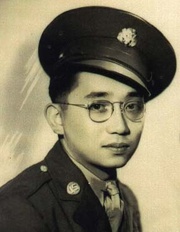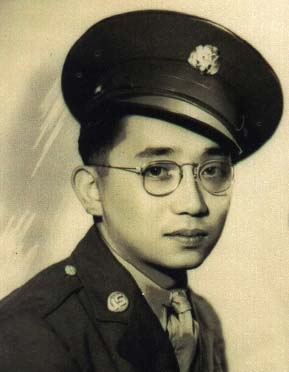
Base de Datos de Experiencias Militares de Japoneses Americanos

Theodore Hiroshi Kaneko
Sexo
Male
Fecha de Nacimiento
1915-12-10
Lugar de Nacimiento
Riverside CA, U.S.A.
Inducted
1942-1-3, Ft. MacArthur, San Pedro CA
Tipo de Alistamiento
Draftee
Afiliación Militar
Army
Tipo de servicio prestado
War
Tipo de unidad militar
Combat
Unidades a las que sirvió
Company H, 442nd Regimental Combat Team, 2nd Battalion
Especialidad militar
Heavy Machine Gunner
Asignado
Camp Grant, IL, USA; Italy, France.
Retirado
Ft. MacArthur, San Pedro CA
Responsabilidad en la unidad
Advanced upon enemy by overhead firing; assisted in capture and holding of enemy positions.
Responsabilidad individual
Performed duties as gunner and ammunition carrier.
Provided automatic direct or indirect fire.
Batallas principales (si sirvió en una zona de guerra)
Italy and France
Reconocimientos, medallas, menciones (individuales o de la unidad)
Good Conduct Medal; European African Middle Eastern Service Medal; 442nd RCT also received Presidential Unit Citations....
Condiciones de Vida
Slept in foxholes. Captain insisted that they be fed rice, hot meals. Had K-rations: canned foods like cheese, Spam, meats. For bathing they would go into town and take showers or use their helmets like buckets to get water from a river. They were dirty most of the time. For entertainment they would go into towns, like Nice or Naples, eat, look at ruins (Naples), see how people lived and look at sights.
Recuerdo más vívido de la experiencia militar
When the Lost Battalion came through 'Big white guys carrying guns just like they were babies while we struggled to carry ours.'
Lo que más extraño durante su tiempo en las fuerzas armadas
Family and being at home.
¿En lo personal, qué obtuvo de su experiencia militar?
He just wanted to get out, get home. It didn't mean that much to him.
Información adicional
The following comments were prepared by grandson, Nathan Mochizuki, from an interview with Theodore Hiroshi Kaneko by children's author, Ken Mochizuki, in December 1999. 1). My Grandpa was drafted just after Pearl Harbor in December and inducted on 3 January 1942. He was 26. He went to Fort MacArthur in San Pedro, CA and then to Camp Grant, near Chicago, IL. It was a medical facility. His Army life consisted of uniforms, standing at attention and being assigned to barracks. He didn't have basic training yet and he worked as a waiter with a group of other Japanese American guys. He served meals to officers, waited on them and cleaned up after them. He remembers they had tablecloths and napkins. He described it as 'A really nice place.' He also said he was treated very well. He did that for about two years. Then in 1943 or 1944 he received orders to go to Fort Blanding, FL for basic training to be a replacement for the 442nd. He said, '...felt like a little kid - didn't know what I was getting into. Didn't even think of what was going to happen. I knew I was going overseas and to war but that was all. I had no other ideas.' He remembers learning about rifles and pistols on the firing range; he also had live fire training. There were about three companies, all Nisei. When he went off base, he never really had any trouble with the locals because they were in uniform. 'Nobody touches you' he said, 'no matter if you're black or white or Japanese.' One thing he thought was funny was these JA fellows came from all over the country, some with Texas accents, New York, southern accents, some from the midwest and Hawaii. My grandpa said, 'You'd start laughing to yourself,' because at night in their barracks you could hear them talking in all their unique accents. He got along fine with all those people, though sometimes he would hear of fights between mainlanders and Hawaiians. He was in training for 8 weeks. Then he went to Camp Shelby for a little while. After that he was off to Newport News, an east coast seaport to be shipped out. He was in a convoy with destroyers alongside, esccorting them and watching for German submarines. He was laughing about this guy who on the first day got seasick. Fortunately he never got seasick. 2). Those ten days getting across, he said, were horrible because you were going up and down, and they had their fair share of storms. For most of the time they just played cards. They docked at Marseille, France. It was his very first time out of the country. At this time he was 28 but he wasn't treated as an older guy. He was assigned to H Company, which was the heavy weapons company of the 2nd Battalion. His job was either to be the ammo carrier or the gunner. But usually the guys who had been in the company longer were the gunners. He was laughing a bit about this one time when he was carryin the ammo. They were going up this steep mountain and he just dropped the ammo. It fell all the way down and he had no clue what happened to it. He carried the ammo in some sort of suitcase. From Marseille they took a train to mid-France, then met up with the rest of the 442nd by trucks. 3). He worked with a team of five or six people, consisting of one gunner, a couple of ammo bearers, water carriers and people who set up the tripod. The machine gun they were assigned to was water-cooled. One experience he remembers was when he was stationed in an area holding a position for the Lost Battalion. They had to set up trenches, machine guns and booby traps with all these dead guys around him. It never really bothered them. What was funny to him was when the Lost Battalion came through the area. He said, 'Big white guys carrying guns just like babies, but we were struggling to carry ours.' Another humorous moment was when the mess hall people would come up with food, they always tried to hurry them up so they could leave, because they didn't like being around those dead bodies. But they always took their time eating. Firefights were something my Grandpa never really got into. The closest experience he ever got into was when a buddy from Hawaii and he were sitting together in a foxhole. There were Germans below and they shot up at my Grandpa and his buddy. A bullet went right into the foxhole, right in between them. He said his section sergeant came tearing over to see if they were okay. The sergeant took their gun and shot down at the Germans. He must have killed somebody or something because he received a Silver Star. Soon after that they pulled out and in the distance there was smoke rising from the mission site where they were supposed to go. My Grandpa went to Genoa in Italy, then down to Rome and then up to Po Valley. He doesn't remember being shelled, only in the area of his comppany. He never saw any Germans up close. The Italian language was something he never could really pick up, so he didn't talk with the civilians. France, he said, was a lot like Seattle, very lush. Italy was more spread out and it didn't have too many trees. In the service he received many letters, and his sisters sent him and his brother Spam, cheese and crackers, but he usually just gave them away. By this time it was 1945 and the war was close to an end. He was in some rock quarries in Po Valley somewhere in the Gothic line area. One guy from his company was in an observation post and a German sniper hit him. He was leader of one of the squads. It was the first time a personal acquaintance was killed. He said, 'It doesn't phase you that much.' He wasn't really sure how he dealt with it. And that was all the combat situations he ever got into. 4). He heard the news of the German surrender before he went to Rome. He doesn't know why they weren't very exuberant. When in Rome, he saw the catacombs. After that he came back to the US at Newport, but there was nobody there to greet them and there were no parties until he got home. He doesn't remember being discharged. My Grandpa served one month short of four years.


